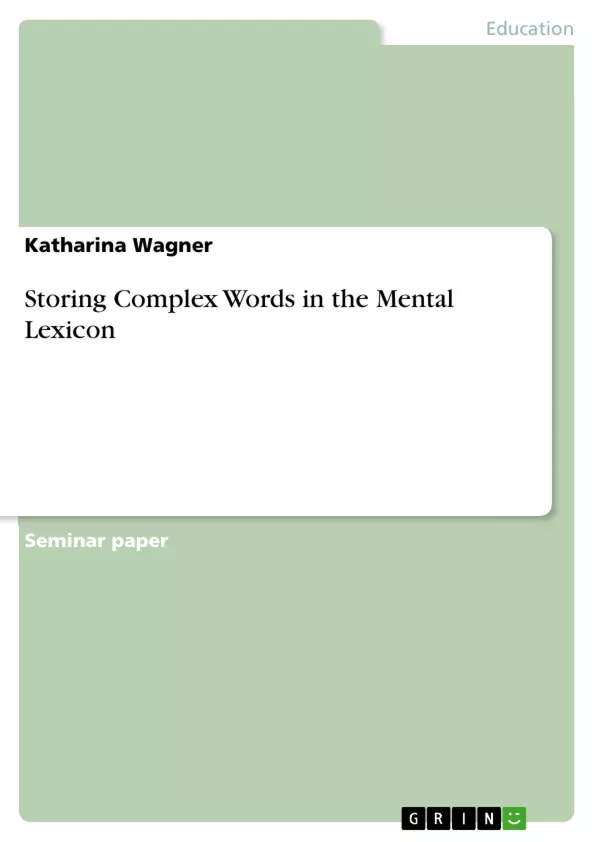The question of what is stored in the mental lexicon might seem unnecessary at first. “Words, of course.”, one might answer, but: what exactly are “words”? If looked at a little closer, a solution to the problem seems a little more difficult than that. In general, one could differentiate between simple words and complex words. Simple words consisting of only one constituent and complex words having more than one. Sometimes even more than two or three. Furthermore – what are constituents? Linguists all over the world talk about roots and morphemes, differentiating between bound and free morphemes, between prefixes, infixes and affixes and between inflection and derivation. This paper will evaluate how exactly complex words are stored in the mental lexicon and how humans access them. With the help of three major theories, the morpheme lexicon, the strict word-form lexicon and the moderate word-form lexicon, and studies for evidence, this paper finds that one theory, namely the one of the moderate word-form lexicon, might rather apply than any other and that dual-route access is more likely than single-route access. First, this paper estimates how one could understand the mental lexicon in general by then explaining different theories of how complex words are stored in there and how lexical access works. In chapter three, several studies will be listed and explained to be interpreted and combined with the introduced theories in chapter four in order to see which theory goes well with another and which applies more likely. Several examples will be shown to explain certain phenomena, such as regular and irregular past-tense forms. Moreover, this paper will take a look at not just the English language, but also Hebrew, German or Latin to show advantages and disadvantages of the theories.
Inhaltsverzeichnis (Table of Contents)
- Introduction What are Words?
- State of the Art
- Data - Priming, Segmenting, Reacting
- General Discussion - How the Mind Works
- Conclusion A Moderate Word-Form Lexicon with Dual-Route Access
Zielsetzung und Themenschwerpunkte (Objectives and Key Themes)
This paper aims to explore how complex words are stored in the mental lexicon and how humans access them. It examines different theories of lexical storage and access, analyzing evidence from various studies. The paper ultimately argues that the moderate word-form lexicon with dual-route access provides a more accurate explanation for complex word processing than other theories.
- The nature of the mental lexicon and its role in language processing.
- Different theories of how complex words are stored in the mental lexicon.
- Evidence from studies on lexical access and word processing.
- The concept of dual-route access and its implications for lexical processing.
- Comparative analysis of different languages, including English, Hebrew, German, and Latin.
Zusammenfassung der Kapitel (Chapter Summaries)
- Introduction - What are Words? This chapter explores the concept of words in the mental lexicon, distinguishing between simple and complex words. It introduces the different types of morphemes and their role in complex word formation. The chapter also outlines the paper's goals and the theoretical framework.
- State of the Art This chapter provides an overview of existing theories on the mental lexicon, comparing various models and their strengths and weaknesses. It discusses the challenges of defining and studying the mental lexicon and introduces the three main theories of complex word storage: the morpheme lexicon, the strict word-form lexicon, and the moderate word-form lexicon. The chapter also discusses the single-route and dual-route models of lexical access.
- Data – Priming, Segmenting, Reacting This chapter presents and analyzes evidence from various studies on lexical access and word processing. It focuses on studies examining the processing of regular and irregular past tense forms in English. The chapter discusses the findings of Prasada and Pinker (1993) and other relevant research.
Schlüsselwörter (Keywords)
This paper focuses on the mental lexicon, complex words, lexical access, morphemes, morpheme lexicon, word-form lexicon, moderate word-form lexicon, single-route model, dual-route model, priming, segmenting, past tense, and language comparison.
Frequently Asked Questions
What is the mental lexicon in linguistics?
The mental lexicon is a mental dictionary where speakers store information about words, including their meaning, pronunciation, and grammatical properties.
How are complex words stored in our minds?
There are different theories: some suggest we store whole words (word-form lexicon), others suggest we store parts like roots and affixes (morpheme lexicon), or a mix of both.
What is dual-route access?
Dual-route access means the brain can either retrieve a whole word directly or assemble it from stored morphemes, depending on factors like word frequency.
What is the difference between regular and irregular past tense forms?
Regular forms (e.g., "walked") follow a rule and might be assembled, while irregular forms (e.g., "went") are likely stored as whole units in the lexicon.
Why does the paper support the moderate word-form lexicon?
The moderate word-form lexicon explains that both whole-word storage and morphemic analysis occur, offering the most flexible explanation for how we process diverse languages.
- Quote paper
- Katharina Wagner (Author), 2016, Storing Complex Words in the Mental Lexicon, Munich, GRIN Verlag, https://www.grin.com/document/516752



